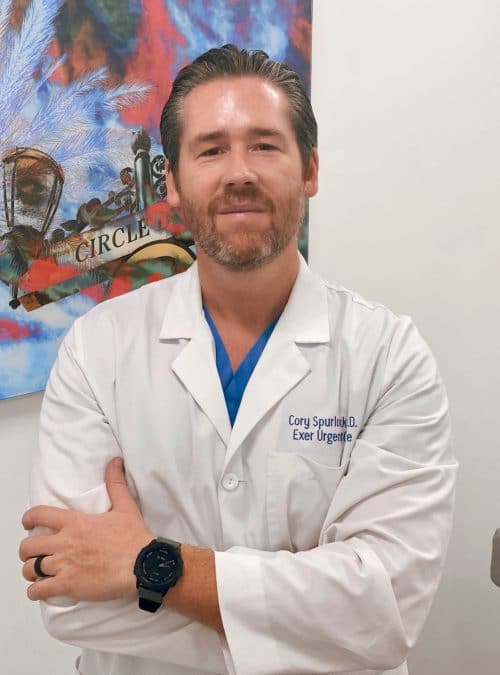As chief medical officer for Exer Urgent Care clinics in Southern California, Dr. Cory Spurlock and his staff have adjusted their focus several times since the onset of the coronavirus pandemic. Patient needs dictated changes in on-boarding, increased testing and new technology.
“It’s kind of what we’re trained to do is to see sick people, and especially in emergency medicine, is to see people in a wild variety of ways and in dynamic situations. And we’ve got to be able to pivot at a moment’s notice to meet those situations,” Spurlock said.
The Striegel family descendant served as medical director of Citizen Potawatomi Nation Health Services from 2005 to 2011. Afterward, he worked as an emergency room physician in Miami, Florida, where he regularly saw infectious diseases originating in the Caribbean. His training in emergency medical care equipped him to handle the coronavirus.

Meeting the moment
Spurlock began working for Exer Urgent Care three years ago, and the company’s significant growth excited him. It plans to add both electronic and physical locations by 2021 to the 16 that already serve patients around the region.
Business slowed down during the spring, almost to a halt. Spurlock said people hesitated to leave their homes, even for routine checkups at urgent care clinics. As time went on and testing became a priority, patients returned for COVID-related symptoms and concerns. The Exer clinics started offering on-site diagnostic testing.
“We have the modalities to test anybody and everybody, and quickly,” Spurlock said. “Now, over the past, probably two weeks, the numbers, the percentages, of those people worried about COVID (are) going down, and the percentage of normal patients, whether it be injuries or illnesses, cardiovascular-type things, all those numbers were starting to steadily rise back to where we were before.”
They also changed their registration procedures to meet social distancing guidelines, including using QR codes to direct individuals to digital forms on their smartphones. Telemedicine and video appointments have become a regular part of Spurlock and his staff’s duties, allowing them to assist more patients and provide peace of mind.
“If those patients are wanting COVID testing, then we refer them directly to a facility. That order is already placed where the patient just has to drive up, informs our front desk staff that they’re there, and one of our staff members goes out to their car and gets them swabbed, and then they’re good to go,” he said.
Self-care
Spurlock believes the Centers for Disease and Control Prevention guidelines for basic health and hygiene will become commonplace. That includes a large percentage of the population remembering to wash their hands for at least 20 seconds, be conscious of touching surfaces, maintain social distancing and wear face masks.
“My biggest thing is self-care,” Spurlock said. “There’s some amazing things that the body can do with just over the counter things or vitamins and the appropriate care. … The immune system is pretty phenomenal on most people. So whether it be the appropriate amount of hydration, vitamins and vitamin c, zinc, that type of thing, exercise.”
The pandemic has also increased overall attention to mental health. Spurlock considers himself a positive person and attempts to find the constructive side of any situation, including the coronavirus and resulting economic crisis.
“I think we have to learn to really trust your heart, trust your mind, do your own investigation, and not focus on the fearful aspects, but focus on what we as family, we as colleagues, and we as humans can do together to join together to try to get on to the next step,” he said.
Faith and family
Spurlock’s Christian faith helps him serve others and remain thankful for time with his wife and son during the quarantine.
“We kind of almost hit a reset button — a pause button to kind of focus on ourselves, our family, those immediate loved ones,” he said. “These large mass gatherings that we’ve all been used to have been put to a halt, and so there’s obviously still frustrations with that. But there’s some good from a public health point, and just from an interpersonal relationship with your family.”
The Spurlocks moved from Miami to Los Angeles, California, three years ago, allowing their 10-year-old son, Andrew, to pursue his dream of acting. He attended acting camps, signed with a management agency and took on new responsibilities after arriving on the West Coast. Spurlock said Andrew is “having a blast.”
“We’re blessed enough to be able to support him in what he wants to do. Obviously, from the beginning, we’ve done the process, but we took little baby steps. And every step of the way, he does an amazing job,” Spurlock said.
His position at Exer Urgent Care provides a stable schedule and allows him to keep up with his son’s passions. Spurlock looks forward to the opportunities both of their careers bring in the coming years.
